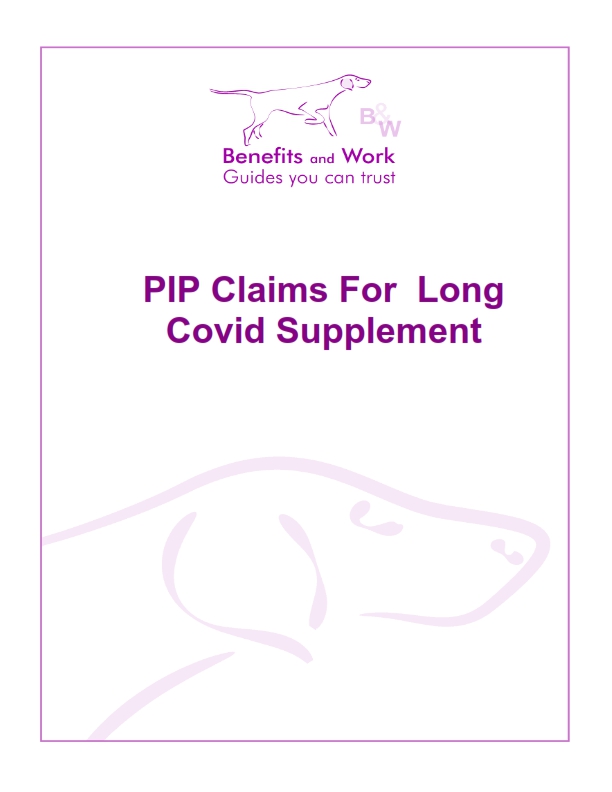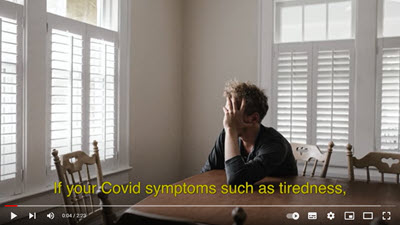Many tens of thousands of people are missing out on PIP for Long Covid if official statistics are to be believed, Benefits and Work can reveal.
DWP figures show that it dealt with an average of just one claim for PIP for Long Covid a day, between March and July 2021.
Yet, according to the Office for National Statistics (ONS), 1.2 million people have Long Covid in the UK, 426,000 have had it for at least a year and 233,000 report that their ability to undertake daily activities has been “limited a lot” as a result.
Benefits and Work looks at the mystery of the missing claimants.

Because the truth is that you don't have to show that you have had a positive test result in order to claim PIP for Long Covid successfully.
You also don't have to show that your initial infection was severe.
Nor do you need to show that you have been prescribed medication for Long Covid or have seen a specialist in order to claim PIP for Long Covid.
And many of the symptoms accepted as being associated with Long Covid by the DWP are ones that would be likely to lead to high scores in a PIP assessment. This includes issues like:
- extreme tiredness (fatigue)
- shortness of breath
- problems with memory and concentration ("brain fog")
- joint pain
- depression and anxiety
These are all problems that would impact on many PIP point scoring activities, such as:
- Preparing food
- Managing therapy and monitoring a health condition
- Washing and bathing
- Dressing and undressing
- Engaging with others face-to-face
- Planning and following a journey
- Moving around
We've produced 7-page PiP for Long Covid supplement, which members can use in conjunction with our Guide to PIP Claims and Reviews to give themselves the best possible chance of getting the correct award of PIP for Long Covid.
You can watch a short, introductory video on claiming PIP for Long Covid. Please share it with anyone you think may be affected.
PIP for Long Covid awards
Whenever a claim for PIP is assessed the DWP decide which condition, where there is more than one, is the claimant’s main disabling condition. It is that condition which is recorded in the stats as the grounds of the claim. Secondary conditions are not recorded.
The DWP began recording claims for PIP for Long Covid from March 2021. Before that cases were just recorded according to the main symptom, such as fatigue or respiratory illness.
Between March and July, the DWP say there have been just 143 claims for PIP for Long Covid, an average of fewer than one a day.
(Please note, the DWP say: Statistical disclosure control has been applied to this table to avoid the release of confidential data. Totals may not sum due to the disclosure control applied).
- March 6 claims
- April 27 claims
- May 37 claims
- June 31 claims
- July 40 claims
108 of those claimants got an award. This is a success rate of 76%, much higher than the average success rate for PIP, which is only around 42% for new PIP claims.
- 35 got enhanced daily living
- 63 got standard daily living
- 8 got no daily living
- 64 got enhanced mobility
- 32 got standard mobility
- 8 got no mobility
29 claimants got the enhanced rate of both components.
It is clear then, that where the DWP assesses an award as being based on a main disabling condition of Long Covid, there is a strong possibility of a PIP award and a good chance of getting the enhanced rate of at least one component.
So why have there been so few claims for PIP for Long Covid?
Number of Long Covid cases
The remarkably small number of claims is definitely not due to there being very few Long Covid cases that have lasted three months and are likely to last for at least another nine months.
According to figures released by the Office for National Statistics on 4 November, an estimated 1.2 million people in the UK have Long Covid, where symptoms have lasted for more than four weeks, as of 2 October. This is up from 1.1 million as of 5 September.
Of people with self-reported Long Covid:
- 240,000 (20%) first had COVID-19 less than 12 weeks previously,
- 849,000 (71%) first had COVID-19 at least 12 weeks previously,
- 426,000 (35%) first had COVID-19 at least one year previously.
Long Covid has adversely affected the ability to carry out daily activities of 780,00 people, 65% of all those who have the condition.
233,000 (19%) report that their ability to undertake daily activities has been “limited a lot”
Fatigue is the most common symptom – experienced by 55% of those with self-reported long Covid – followed by shortness of breath (39%), loss of smell (33%) and difficulty concentrating (30%).
Aside from loss of smell, these are all symptoms that would be extremely relevant to both the daily living and mobility components of PIP.
Long Covid is most common in people aged 35-69 years old, but it is increasing amongst 12 to 16 years and 17 to 24 years, with the latter now comparable to people aged 35 to 69 years
So the majority of people with Long Covid would fit within the age range for a claim for PIP.
It’s worth noting that according to DWP statistics there were just six people getting attendance allowance for Long Covid and we couldn’t find any awards of disability living allowance for Long Covid at all.
According to a report by Imperial College London, the proportion of people with COVID-19 symptoms rapidly declines after the first four weeks, followed by a small drop by 12 weeks. However, there was little change after 12 weeks, even at a 150 day (5 months) follow-up.
Professor Paul Elliott, director of the REACT programme from Imperial’s School of Public Health, said: “Our findings do paint a concerning picture of the longer-term health consequences of COVID-19, which need to be accounted for in policy and planning”.
What this suggests is that anyone with Long Covid that has lasted more than 12 weeks with no signs of improvement, and which affects their mobility or ability to carry out the PIP daily living activities, should meet the PIP test that requires it to be likely that the effects of their condition will last for at least another nine months.
Based on these figures there should have been many tens of thousands of claims for PIP for Long Covid by now and the majority should have been successful.
More than one condition
One partial explanation for the very low numbers is that many people with Long Covid may also have other serious health conditions
According to ONS, Long Covid is more common in certain groups of people. These include
- females,
- people living in more deprived areas,
- those working in health or social care,
- those with another activity-limiting health condition or disability
So some people with Long Covid may already have a health condition that means they are in receipt of the highest rates of PIP and not eligible for a higher award because of Long Covid.
Or they may have received a higher award because of Long Covid but the DWP still classify their original health condition as their main disabling one.
But there is no suggestion by ONS that all, or even most, people with Long Covid have another serious health condition.
On its own, this cannot explain the DWP statistics relating to PIP for Long Covid.
Fiddling the PIP for Long Covid figures
Having many tens of thousands of people awarded PIP for Long Covid would not be in the interests of the government. It would call into question whether the only measures of success in dealing with the pandemic are how many people die and whether the health service is overwhelmed.
Instead, it would suggest that how many people are infected is vitally important in measuring the long-term effects on individuals and on society.
In which case it would be in the interests of the government to ensure that the DWP classify awards of PIP for Long Covid as being based on any other health condition the claimant has, regardless of how severe that other condition really is.
So where, Long Covid was mentioned in a claim or a change of circumstances, careful checks would need to be made to ensure that wherever possible it wasn’t listed as the main disabling condition.
DWP staff are told in guidance obtained by Benefits and Work that in every case where a claimant reports that they have Long Covid, they must be referred to an assessment provider even if it could make no difference to their award..
“Even if a customer is already on enhanced and enhanced and has now reported Post/Long COVID syndrome as a condition you should still refer these cases to an AP - In-house decisions must not be made on any case where Post/Long COVID syndrome is stated as a disability.”
Is the reason for this that the DWP want to ensure that cases are not listed as being based on Long Covid wherever it is possible to avoid it?
Lack of awareness
There may be many people with Long covid who either don’t know about PIP or don’t think that they can claim PIP for Long Covid, so reducing the number of claims.
So, for example, people may wrongly think that they have to have had a positive test for COVID-19 before they can claim PIP for Long Covid.
They may think that they have to have been diagnosed with Long Covid to claim PIP on those grounds. This isn’t the case.
They may mistakenly think that you have to prove that you had a severe case of COVID-19 to make a claim. Again, this is incorrect.
They may think they have to have had it for at least a year, before they can make a claim. This isn’t right either.
Or they may just think that there is no chance of getting an award of PIP for Long Covid, so it isn’t worth trying. In fact, as we have seen, your chances of an award are a great deal higher than for most other conditions.
What we can do
It is entirely possible that the reason for the astonishingly low level of awards of PIP for Long Covid is a combination of all these factors.
It will probably be impossible to prove whether the DWP is cooking the books. To do so, we would need to know, at the very least, how many claimants mentioned COVID-19 in their claim. And you can be certain that the DWP will say that they don’t record this data and it would be too expensive to attempt to create it.
But we can do something about the possible lack of awareness of the right to claim PIP for Long Covid, by simply spreading the word to anyone you know with the condition and by publicising the fact on social media and elsewhere.
People need to know that you can claim PIP for Long Covid and your chances of getting an award are high.
Because, if the ONS and DWP’s figures are correct, there are tens of thousands of people in the UK struggling to manage daily living activities who are missing out on financial help that would make it easier for them to do so.
Benefits and Work members can download a 7-page, Long Covid PIP supplement, to be used in conjunction with our Guide to PIP Claims and Reviews.



